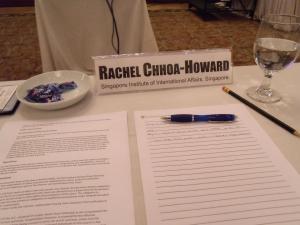Today I am in Manila, participating in the Regional Forum on the Rome Statute of the International Criminal Court. In fact, I have just finished speaking on a panel which discussed the history and background of this important and relatively new institution.
The International Criminal Court (ICC) was created to hold individuals accountable for the most serious international crimes of concern to the international community – namely, genocide, crimes against humanity and war crimes. The idea for a Court for such crimes was suggested following the horrors of WWII, however, its realisation is fairly recent, with the Statute of the Court (known as the Rome Statute) having entered into force in 2002. In 2010, an extra crime was added – the crime of aggression which is the use of armed force by one State against another State without the justification of self-defense or authorization by the United Nations Security Council.The aim of the ICC is to prosecute those responsible for crimes committed since 2002, and deter future crimes from taking place.
And though it receives criticism for its choice of cases, and speed of progress, the ICC is prosecuting individuals. The last time I was at a conference, to discuss issues of the Court (The 2008 Assembly of States Parties of the ICC, in the Hague, the Netherlands, where the Court is located), there were 108 ratifications of the Rome Statute. That is, 108 states had agreed to come under the jurisdiction of the court. In other words, if an individual from their state is accused of one of the above crimes, they will be surrendered to the court (if the state is unable or unwilling to prosecute them at home). 3 years on, 119 states have ratified the Statute. 13 cases in 7 situations have been brought before the International Criminal Court, bringing individuals from Uganda, the Democratic Republic of the Congo and the Central African Republic charged with crimes. In addition, the situations of Kenya, Sudan and Libya, among others are currently under review.
A greater understanding of the Court is crucial. The ICC is a court of last resort. Ideally, it would not exist at all, as states would be able to prosecute individuals for these crimes in their own territories. The other alternative, that these crimes would never take place at all, is a little unrealistic, the example of Libya being a case in point. Ultimately, the purpose of the court is to become a deterrent for heads of states and other individuals to ensure they do not commit heinous acts against their own, or foreign citizens.
The ICC in Asia
Asia remains the region with the lowest level of ratification to the Statute. In South East Asia, 3 states have ratified the Rome Statute – Cambodia, East Timor and most recently, the Philippines.
At first glance, it may seem intuitive to protect individuals, no matter where they are, from such grave crimes. However, the Court remains contentious in a world in which states are still learning to accept international human rights law. International criminal justice is a paradigm shift that states have not yet come to terms with. The landscape has fundamentally changed, but many new players have not bought into the system yet, and some have actively opposed it.
In order to increase support for the court, states and civil society must work hard to push for greater ratification. Now that the Philippines has stepped up in favour of the court, it is urging other Asian states including Malaysia, Nepal and Indonesia to take the final steps necessary, to make good on government’s promises to become ICC state parties.
Universal acceptance of the Court, is still a way away. However, the growth of international human rights law in South East Asia, and in particular, the ASEAN Commission on Human Rights, offers an opportunity for states to ensure that the Court becomes a credible and effective mechanism to prevent the worst crimes from taking place.
The Regional Forum on the Rome Statute of the ICC, organised by LAWASIA Philippines and the Konrad Adenauer Stiftung Foundation, is a much needed contribution to knowledge sharing on the ICC in South East Asia. Over two days, diplomats, experts, lawyers and academics are discussing the accomplishments and current issues affecting the court, and the ICC in Asia – we have even had some opera on the programme! From my observations so far, this forum is crucial and much needed, for there is a lot of work to be done in educating stakeholders on the workings of the Court in this region. There is also a great opportunity for Asian states to accede and accept the jurisdiction of the Court, at a time when support for international human rights law is growing. Genocide, crimes against humanity and war crimes are surely acts worth protecting all Asians from.
There is much more to say on the ICC, including a discussion of the controversies and challenges facing the Court, which I will try to address in a future post. In the meantime, more information on the Court, including information on the Philippines recent ratification of the Statute can be found here:
Information sheet: About the Court (International Criminal Court Official Website)
Article: CICC Hails Philippine Action on the Rome Statute (Forum Asia)
